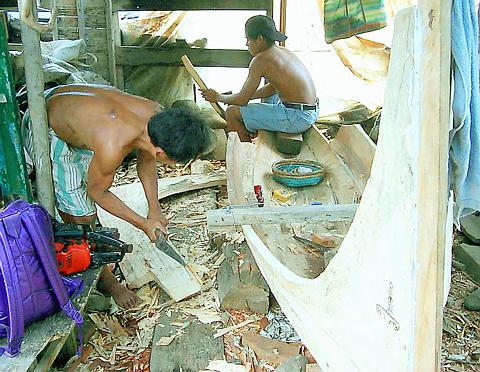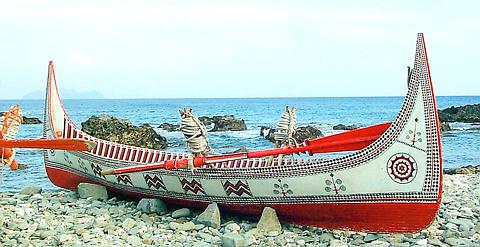Driving along the rocky coast of Orchid Island (Lanyu,
It is the pastoral lifestyle of Orchid Island, the azure sky, the deep blue Pacific Ocean, green mountains and distinct culture that makes this 45 sq km island a modern-day Xanadu.
But Orchid Island's beauty hides scars as well.

PHOTO: CHUI YI-FEI, LIBERTY TIMES
Not far from where the man was standing, a harbor was built to unload nuclear waste from the Taiwan to be stored on the island.
Aboriginal rights activists think autonomy is the best solution to improving the island's situation and developing it in a way that would suit the people who live there.
History

PHOTO: CHIU YI-FEI, LIBERTY TIMES
Located to the southeast of Taiwan, Orchid Island has a population of nearly 3,000 indigenous Tao residents -- referred to in the past as the Yami by both the KMT and scholars in the past -- and hundreds of Taiwanese migrants.
There is no official hospital or medical doctors on the island. Six traditional tribes are incorporated into four administrative villages, with four primary schools and one high school.
Only two airlines, with five flights which can seat about 100 passengers, service the island. These offer natives and tourists alike a link with the southeastern city of Taitung. The flights are often canceled, however, due to the heavy rains and strong winds prevalent in the area.
Over the years, Christianity has spread among the islanders and has greatly influenced their beliefs. There are currently 13 churches on the island.
Under Japanese colonial rule the island was declared a research area for native species. The Japanese later prohibited migration to and development of the island. This preserved Orchid Island's distinct cultures and natural environment for the 50 years that Taiwan remained Japan's colony.
After World War II, the KMT took control of Taiwan and with it, Orchid Island. From that time on the KMT began to implement a "Hanization" policy (The Han are the main ethnic group in Taiwan), which diluted traditional culture on Orchid Island. A national housing (國民住宅) policy and the opening up of the island to tourism has also reshaped the cultural landscape of the island.
Dismantling traditional culture
From 1966 to 1980, in the name of development, the KMT asked islanders to dismantle their traditional underground houses and construct modern cement houses.
"That ensured the disappearance of the traditional cultures and community activities related to the traditional houses," said Si Manpang (
At first, most of the islanders refused to live in the cement houses. The design of traditional houses fits with Orchid Island's natural environment. Building under the ground keeps rooms cool in the summer and avoids strong, cold winds in the winter.
The modern houses were often poorly built as well. In addition to implementing improper designs, some builders used vast quantities of sea sand in the cement used in the construction. The result was that many of the so-called "sea sand houses" collapsed.
The construction of new homes can be seen everywhere on Orchid Island today, making the island look like a large worksite. The current wave of construction is an attempt to remedy the problems caused by the previous national housing policy.
Another change to islanders' lives came in 1967, when the KMT decided to allow tourism and development on Orchid Island. Curious tourists swarmed to the island and severely disturbed islanders' lives, scholars say.
The nuclear nightmare
Until dramatic anti-nuclear protests began in 1987, Orchid Island was considered a quiet, remote area. Since then, people around the world have learned how these islanders have lived with nuclear waste in their backyard, one island elder said.
"The nuclear waste has been our nightmare for decades and has caused many strange diseases and mental problems for our people," the elder said.
Islanders accuse Taipower and the Atomic Energy Council of lying to them in order to establish a nuclear waste storage site on the island in 1980. "They cheated us by saying they were going to build a can factory," the elder said.
According to island activists, there are currently about 96,000 barrels of nuclear waste stored on the island. Over 30,000 barrels have rusted, causing nuclear waste to leak. This is thought to be the main cause of both a high cancer death rate and birth defects affecting over 50 children.
When asked their feelings on this issue, one islander replied, "The question makes me feel sleepy," referring to the fact that the issue has remained unanswered for more than a decade.

A car bomb killed a senior Russian general in southern Moscow yesterday morning, the latest high-profile army figure to be blown up in a blast that came just hours after Russian and Ukrainian delegates held separate talks in Miami on a plan to end the war. Kyiv has not commented on the incident, but Russian investigators said they were probing whether the blast was “linked” to “Ukrainian special forces.” The attack was similar to other assassinations of generals and pro-war figures that have either been claimed, or are widely believed to have been orchestrated, by Ukraine. Russian Lieutenant General Fanil Sarvarov, 56, head

SAFETY FIRST: Double the number of police were deployed at the Taipei Marathon, while other cities released plans to bolster public event safety Authorities across Taiwan have stepped up security measures ahead of Christmas and New Year events, following a knife and smoke bomb attack in Taipei on Friday that left four people dead and 11 injured. In a bid to prevent potential copycat incidents, police deployments have been expanded for large gatherings, transport hubs, and other crowded public spaces, according to official statements from police and city authorities. Taipei Mayor Chiang Wan-an (蔣萬安) said the city has “comprehensively raised security readiness” in crowded areas, increased police deployments with armed officers, and intensified patrols during weekends and nighttime hours. For large-scale events, security checkpoints and explosives

PUBLIC SAFETY: The premier said that security would be tightened in transport hubs, while President Lai commended the public for their bravery The government is to deploy more police, including rapid response units, in crowded public areas to ensure a swift response to any threats, President William Lai (賴清德) said yesterday after a knife attack killed three people and injured 11 in Taipei the previous day. Lai made the remarks following a briefing by the National Police Agency on the progress of the investigation, saying that the attack underscored the importance of cooperation in public security between the central and local governments. The attack unfolded in the early evening on Friday around Taipei Main Station’s M7 exit and later near the Taipei MRT’s Zhongshan

REBUFFED: In response to Chinese criticism over recent arms sales, Washington urged Beijing to engage in meaningful dialogue instead of threats and intimidation Washington’s long-term commitment to Taiwan would not change, the US Department of State said yesterday, urging Beijing to stop pressuring Taiwan and engage in meaningful bilateral dialogues. The remarks came in response to a backlash from Beijing about Washington’s latest approval of arms sales to Taiwan. The US Defense Security Cooperation Agency said in a statement on Wednesday that the Taipei Economic and Cultural Representative Office in the US has asked to purchase an arms package, including Tactical Mission Network Software; AH-1W helicopter spare and repair parts; M109A7 self-propelled howitzers; HIMARS long range precision strike systems; tube-launched, optically tracked, wire-guided missiles; Javelin